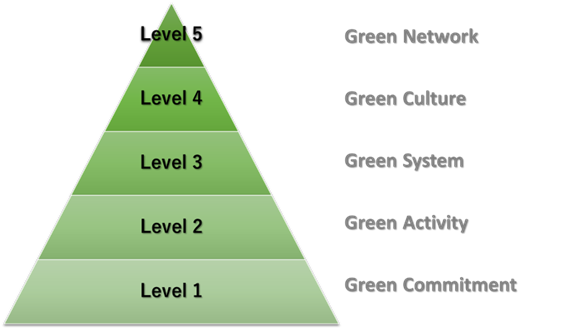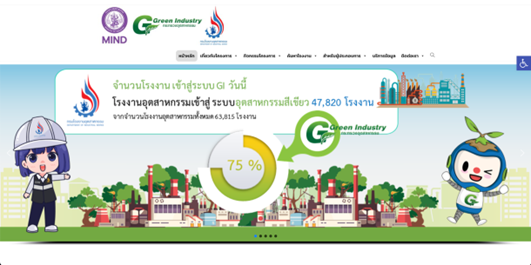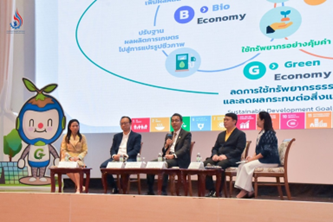Thailand has set its mission for Sustainable Development since it ratified the Johannesburg Declaration on Sustainable Development (JDSD) in 2002, the Manila Declaration on Green Industry in 2009, and the Paris Agreement under the UNFCCC framework, which was ratified during COP21 at Paris in 2015 and includes collective efforts to maintain global average temperature increase below 2 degrees Celsius compared to pre-industrial levels, with efforts to limit it to 1.5 degrees Celsius to mitigate severe impacts from climate change.
Such agreements mentioned have motivated the Ministry of Industry to establish strategies for industrial development so that it can be aligned with environmental and societal considerations. The strategies involve proactive measures to promote and develop industries in a sustainable manner. However, Thailand’s industrial development in the past mainly emphasized on economic growth, particularly in resource-intensive production industries. As time goes by, Thai society started facing various challenges stemming from continuous industrial development, such as resource depletion, environmental issues, social inequalities, and limited stakeholder participation. These issues have highlighted an imbalanced development path, indicating that merely focusing on the economic growth-driven industrial development aspect is insufficient for achieving sustainable development. Hence, a balanced approach is imperative for achieving development and elevating industries in various aspects. This approach includes industries focused on the aspects of environmental conservation, social development, and stakeholder engagement. Recognizing the interdependence among these aspects of industrial development, a comprehensive approach is essential.
What is Green Industry?
At the end of the year 2010, the Ministry of Industry began implementing the Green Industry project. This project involved the execution of Memorandum of Understanding (MOUs) among various departments under the Ministry of Industry to collectively promote the environment- and society- friendly industrial practices in Thailand. This effort aimed at improving the reputation, credibility, and public trust of the industrial sector, to serve as a starting point for the development of a Green Economy. This transition would lead to higher value in the country’s Green Gross Domestic Product (Green GDP). The Ministry of Industry united all agencies and network institutions under its umbrella, especially provincial industrial offices, and industrial estates, to foster a nationwide commitment to environmentally friendly business operations. This development was segmented into five levels of green industry evolution which are:

- Level 5 – Green Network: Green industry practices are extended beyond the organizational boundaries to external partners, along supply chains, by supporting business associates and allies to become part of the green industry movement.
- Level 4 – Green Culture: Green practices are ingrained in organizational culture, with all members reserving and conserving the environment and willingly cooperating in various business aspects to maintain environmental friendliness.
- Level 3 – Green System: Environmental matters are systematically managed, continuous monitored, evaluated, and reviewed to ensure ongoing development or acknowledgment through environmental awards and certifications.
- Level 2 – Green Activity: Activities are conducted in line with policies, goals, and plans set forth to reduce environmental impact and achieve the established commitments.
- Level 1 – Green Commitment: A commitment to reduce environmental impact is demonstrated through policies, goals, and plans, with transparent communication within the organization.
Criteria and requirements for the Green Industry as well as how to register factories under the Green Industry program, and updates of green industry program can be found on the Green Industry website at https://greenindustry.diw.go.th/webgi/, with a top page shown below.

Green Industry Website
Results from Green Industry
In a separated article on 2021, Ministry of Industry reported that continuous implementation of the Green Industry project has led to a reduction in Thailand’s greenhouse gas (GHG) emissions over a span of three years of 2017–2019, totaling more than 164,473 tons of CO2 equivalent per year. In the year 2017, GHG emissions were reduced by 12,528 tons of CO2 equivalent. In 2018 and 2019, the reduced amount was 64,357 tons and 87,588 tons of CO2 equivalent, respectively. Furthermore, it has been also indicated that waste management efforts are in the trend of improvement due to proper waste disposal practices. Indeed, the amount of industrial waste entering the waste management system has been consistently decreasing. In the year 2017, a total of 32.95 million tons of industrial waste entered the management system. In 2018, this reduced to 22.02 million tons, and in 2019, it further decreased to 17.25 million tons. As of the end of May 2020, the amount of industrial waste entering the system was 9.38 million tons. Regarding hazardous industrial waste management between 2018 and the end of May 2020, the figures were 1.2 million tons/year, 1.33 million tons/year, and 0.71 million tons/year, respectively.”
Future Development and Expansion of Green Industry
On July 27th, 2023, Dr. Nattapol RANGSITPHON, the Permanent Secretary of the Ministry of Industry, presided over the ‘Green Industry Award Reception and Knowledge Exchange Seminar’ as part of “Development of Businesses towards Green Industry and Building Social Awareness” project, on which the Department of Industrial Works is working in this year. The event took place at Army Club Bangkok.
The Permanent Secretary of the Ministry of Industry stated that the ministry is currently leading efforts to accelerate policies aimed at transforming Thailand’s industrial sector. This work is undertaken through the ‘MIND’ concept, which refers to use of head and heart to shape community-friendly industries, ensuring a balanced and sustainable approach that aligns industries with the new 4-aspects path. The aim is to achieve business success, adapt businesses to the future world, take care of communities surrounding industrial sites, reduce the risk of conflicts, and stimulate good business practices while caring for the environment. The goal is to reach carbon neutrality by the year 2050 (B.E. 2593) and to achieve net-zero GHG emissions by the year 2065 (B.E. 2608), while simultaneously improving the quality of life for people.
 Green Industry Seminar on July 27th, 2023
Green Industry Seminar on July 27th, 2023
(Taken from Department of Industrial Works’ Facebook)
Additionally, incentives are given to those who contribute positively to the society, fostering social enterprise (SE) collaborations with communities and networks to genuinely improve the lives of the people. Starting from 2023, Department of Industrial Works will utilize the “iSingle Form,” a centralized data reporting system of the Ministry of Industry through the “i-Industry” customer registration system to streamline reporting compliance with green industry standards across various levels.
The Green Industry project aims to promote production, investment, and the creation of green jobs, raising the nation towards an environmentally friendly and socially responsible economy. It also focuses on fostering expertise, assessors, and experts in green industries, ultimately serving businesses and assisting their development. As of 2023, there are 46,058 certified Green Industry factories out of a total of 64,018, distributed among different levels as follows:
- Level 1: Green Commitment – 38,913 factories;
- Level 2: Green Activity – 3,078 factories;
- Level 3: Green System – 3,491 factories;
- Level 4: Green Culture – 496 factories; and
- Level 5: Green Network – 80 factories.

On July 27th, 2023, event, 160 business establishments were awarded for their commitment to green industry practices, including 122 at Level 4 and 38 at Level 5. These businesses serve as examples and guidelines for other establishments. The Green Industry project has resulted in a positive impact on the nation’s perception of environmentally friendly industries, instilling trust, and credibility. Furthermore, it contributes to the development of the green economy, thus increasing the value of the nation’s Green GDP.
Green Industry program is one of the most important strategic projects of the Ministry of Industry. Mr. Suriya JUNGRUNGREANGKIT, the Minister of Industry, revealed that the Ministry of Industry has instructed the Department of Industrial Works to proactively drive the transformation of all factories nationwide, towards becoming Green Industries. The goal is that by 2025, all factories must achieve Green Industry certification. This aligns with the Green Industry Promotion and Development Plan 2021 – 2037, emphasizing the enhancement of management efficiency, promotion, oversight of environmental quality for establishments, fostering awareness and understanding of Green Industries, and eventually elevating Green Industries to the ASEAN and international level.
 Thailand, Progress on Green Industry Program
Thailand, Progress on Green Industry Program
























